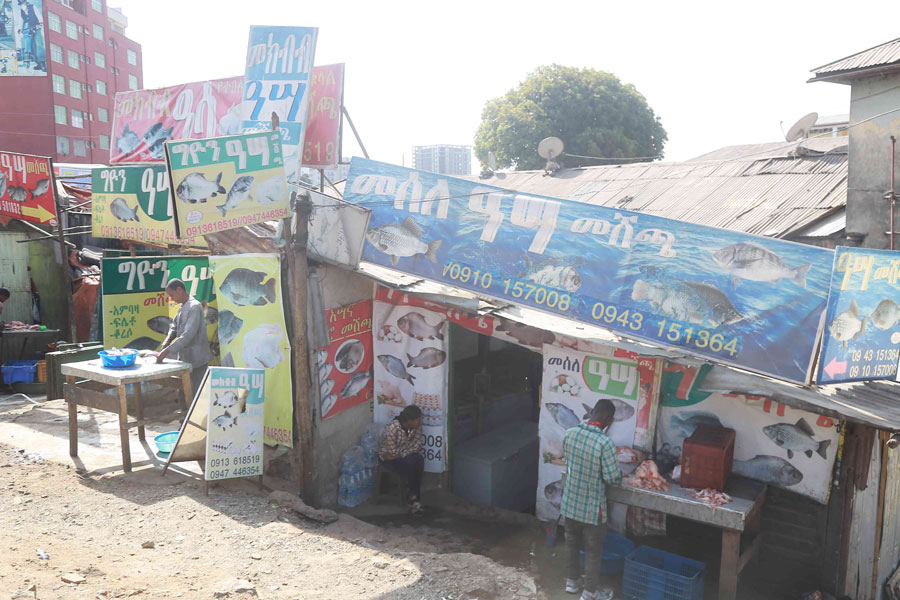
Editorial | Aug 01,2020
Aug 18 , 2024.
The economy is in turmoil, and describing the situation as merely dire could be an understatement. The federal government’s response to the unfolding crisis has been to clamp down on businesses, targeting market forces to quell what could be understood as a rational response to policy outcomes.
Federal and regional authorities have shut down tens of thousands of businesses, accusing them of hoarding goods or adjusting prices in response to currency volatility. In the past week alone, 15 cement retailers and seven rebar sellers were closed for allegedly adjusting their prices. An astonishing 24,328 businesses were coerced into signing agreements to keep prices unchanged, a compromise they had to accept to continue business.
The state seems intent on forcing businesses to absorb losses from currency fluctuations or reduce their profit margins to levels deemed acceptable by the market, a move that is deemed to stifle economic incentives. Compounding these issues are the import duties following the switch to a floating exchange rate regime, using the central bank’s daily indicative exchange rate, resulting in higher import costs.
The volatilities in the market is a direct consequence of the fiscal and monetary policy choices made by Prime Minister Abiy Ahmed’s (PhD) administration. These policies were crafted in response to a precarious economic reality that threatens to unravel what was once a formidable growth story in Africa. Ethiopia’s macroeconomic situation is beset by a series of unfortunate, partly self-inflicted setbacks. These have been exacerbated by a cluster of domestic crises, compounded by external borrowing and global shocks. The result is a bleak picture of economic fragility.
Ethiopia, long one of the least-developed economies, has been particularly hard hit by a trifecta of adversities: domestic wars, the aftermath of a global pandemic, and the ripple effects of Russia's war in Ukraine. These have severely pressured the economy, leading to high inflation, a slowdown in exports, a scarcity of foreign exchange, and a depletion of international reserves, which stood at a mere one billion dollars in 2024.
Its external debt has ballooned to nearly 29 billion dollars, and the economic outlook is grim. Both political and economic reforms are undeniable, if long overdue.
Once driven by a public investment-led growth model, the economy now requires a shift towards a more sustainable and internally robust regime. Undoubtedly, the public investment model has reached its limits, demanding a departure towards a growth strategy powered by the private sector. Policymakers have responded by crafting what they have termed the “Home-Grown Economic Reform Agenda,” a blueprint designed to enliven the economy. The ambitious plan seeks to modernise the macroeconomic policy framework, enhance competitiveness, and lay the groundwork for a private sector-led growth trajectory.
Among the key components of this reform agenda are adopting a market-determined exchange rate, upgrading the central bank’s monetary policy-making capacity, closing fiscal revenue gaps, and reforming inefficient state-owned enterprises. It has garnered international support, most notably in the IMF's four-year Extended Credit Facility (ECF) arrangement amounting to 3.4 billion dollars. Contrary to popular belief, this sum is not being funnelled directly into government coffers; rather, it is intended to support the implementation of rigorous reforms and provide a cushion for foreign exchange reserves. The credit facility is akin to businesses receiving guaranteed bonds to secure credit.
Alongside generous support from development partners, Ethiopian authorities have pinned their hopes on these reforms to regenerate the economy, addressing structural weaknesses that have contributed to the country’s balance-of-payments problems. Against all odds, the authorities hope that the economy will gradually regain strength, and that inflation may moderate.
However, the economy faces immense tides and substantial risks. High external debt, fiscal imbalances, and deep structural vulnerabilities besiege the country. Comprehensive reforms are indeed imperative if economic stability is to be restored and sustainable growth achieved. If implemented wisely and thoroughly, the reforms could help Ethiopia overcome its economic difficulties and chart a course towards a more optimistic future.
The reform program's success and rapid progress in implementing external debt treatment will be crucial in realising the positive outlook. Ethiopia's economic turmoil is not inevitable; with potent reforms, there is a glimmer of hope that the country could weather the storm and emerge with a more stable and resilient economy.
Yet, there is a caveat.
Underneath this cautiously optimistic projection lies a bedrock of formidable risks. Social and political discontent simmers beneath the surface, security crises remain unresolved, and volatile global commodity prices continue to threaten recovery. The authorities' reliance on coercive measures to manage the aftereffects of their policies should be highly doubtful.
Excise tax stamps, which have rattled players in industries such as alcohol, tobacco, brewing, and water bottling, are manifestations of the broader issues. Unclear tax codes and unfounded tax claims have united industry players in their grievances, exposing unclear regulations, bureaucratic burdens, and allegations of corruption. The abrupt tightening of rules on duty-free privileges has left investors confused, and the shift in the policy has been sudden and disorienting.
The problems do not end there. Businesses are also wrestling with sluggish customs processes, with cargo stranded at ports due to overloading, and the increased tax burden imposed by the floating exchange rate. They are being told to shoulder the transaction costs associated with the loss of value of the Birr, pushing them to the brink. Taking cargo shipments from importers and distributing them to cooperatives flies in the face of free-market principles. Customs processes, already sluggish, would become an inflationary transmission channel.
The customs authority’s mandate was meant to efficiently collect taxes and duties, combat contraband and illicit trade, and facilitate foreign trade while protecting legitimate traders from unfair practices. The legislative body enacts various rules and regulations to ensure this, and customs authorities merely apply these rules; they are not tasked with managing inflation, which has its source in fiscal expansion and monetary policy changes.
The customs authorities should focus on controlling corruption and adopt technological tools to respond to the changing market environment. The Ministry of Finance and the National Bank of Ethiopia (NBE) should address these issues more efficiently during this transition period, or businesses will be forced to pass on the extra costs to consumers, regardless.
The floating exchange rate regime introduced a few weeks ago has expected implications, including the need to manage transaction costs from the movement of the Birr against other currencies. Businesses should prepare for fierce competition and narrower profit margins, as the era of exorbitant margins is coming to an end.
The widening spread between the buying and selling rate of the US Dollar — above 10pc for most banks, except for Gadaa Bank, which set it around 7.8pc on Friday — could serve as a telltale sign of problems in the liberalised market regime. Reports of banks demanding deposits ranging from 100pc to 250pc for letters of credit (LCs) are another source of liquidity pressure on businesses, as this practice effectively limits the availability of Birr through official channels.
The inflationary pressure resulting from the forex regime change was imminent, and the authorities should have been prepared to deal with the rapture rather than resorting to force. Kassahun Gofe, minister of Trade & Regional Integration (MoTRI), pledged to continue the crackdown on businesses he believes are to blame for price gouging. It is against the spirit of the economic reform agenda agreed with the IMF. Records show that such desperate official acts are unsustainable, as they run counter to the rationale of business in optimising profits. Creating a policy environment for competition by addressing structural issues on the productive side of the game would help the market.
Policymakers should acknowledge that the unfolding economic situation has entered a critical phase characterised by state interventions leading to market disruptions. The federal and regional governments have taken drastic and unsavoury measures. These actions expose a deeper economic crisis where policy responses are increasingly seen as reactionary rather than strategic. It is up to them to reassure market forces - not cause hysteria - and rekindle hope.
PUBLISHED ON
Aug 18,2024 [ VOL
25 , NO
1268]

Editorial | Aug 01,2020

Fortune News | Dec 11,2021

Agenda | Feb 25,2023

Commentaries | Jul 13,2020

Fortune News | Dec 12,2020

Fineline | Nov 02,2019

Agenda | Jan 21,2023

Viewpoints | Jun 08,2024

Fortune News | Sep 24,2018

Fortune News | Oct 28,2023

Photo Gallery | 176092 Views | May 06,2019

Photo Gallery | 166305 Views | Apr 26,2019

Photo Gallery | 156747 Views | Oct 06,2021

My Opinion | 136876 Views | Aug 14,2021

Dec 22 , 2024 . By TIZITA SHEWAFERAW
Charged with transforming colossal state-owned enterprises into modern and competitiv...

Aug 18 , 2024 . By AKSAH ITALO
Although predictable Yonas Zerihun's job in the ride-hailing service is not immune to...

Jul 28 , 2024 . By TIZITA SHEWAFERAW
Unhabitual, perhaps too many, Samuel Gebreyohannes, 38, used to occasionally enjoy a couple of beers at breakfast. However, he recently swit...

Jul 13 , 2024 . By AKSAH ITALO
Investors who rely on tractors, trucks, and field vehicles for commuting, transporting commodities, and f...

Oct 18 , 2025 . By NAHOM AYELE
In a sweeping reform that upends nearly a decade of uniform health insurance contribu...

A bill that could transform the nutritional state sits in a limbo, even as the countr...

Oct 18 , 2025 . By SURAFEL MULUGETA
A long-planned directive to curb carbon emissions from fossil-fuel-powered vehicles h...

Oct 18 , 2025 . By BEZAWIT HULUAGER
Transaction advisors working with companies that hold over a quarter of a billion Bir...